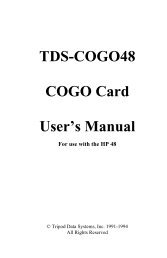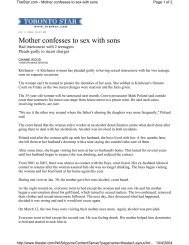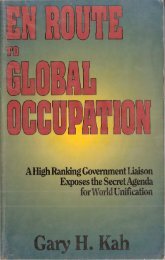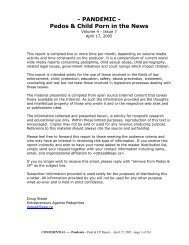G. Edward Griffin - The Fearful Master - PDF Archive
G. Edward Griffin - The Fearful Master - PDF Archive
G. Edward Griffin - The Fearful Master - PDF Archive
You also want an ePaper? Increase the reach of your titles
YUMPU automatically turns print PDFs into web optimized ePapers that Google loves.
delegation upon hearing of my withdrawal and, as a result of the<br />
meeting, the Americans had agreed to revert to their original support of<br />
my candidacy. <strong>The</strong> Soviet Union would nominate me, he added, and the<br />
Americans would vote for me. . . .<br />
Mr. Gromyko strode to the rostrum and declared:<br />
"Weighing the candidatures which have recently been mentioned in<br />
connection with the election of the president the Soviet delegation has<br />
come to the conclusion that the most appropriate candidature would be<br />
that of the foreign minister of Norway, Mr. Trygve Lie." . . .<br />
Wincenty Rzymowski of Poland then rose in dutiful support of the<br />
nomination, and spoke of Norway and of me in generous terms. He was<br />
followed by Dimitri Manuilsky, the "old Bolshevik" from pre-Stalin days<br />
who was then foreign minister of the Ukrainian SSR. . . .<br />
Spaak won the election by just three votes, but, as Lie reminisced: "<strong>The</strong>re is no doubt that<br />
the results of that election were felt long after, and clearly influenced the subsequent<br />
election of the secretary-general." 11<br />
<strong>The</strong> post of secretary-general is infinitely more important than that of president of the<br />
assembly. So when the time came to fill this post, Washington and Moscow once again<br />
moved in unison. Lie wrote:<br />
I recall something that Andrei Vyshinsky said in the course of a<br />
conversation in London just before my election as Secretary-General. It<br />
was a most friendly talk in which Vyshinsky said that both the Soviet<br />
Union and the United States warmly advocated my nomination, and that<br />
Mr. Bevin [of Great Britain] could be "brought around." 12<br />
As mentioned previously, Trygve Lie was outspoken in his advocacy of the admission of<br />
Red China to the United Nations. He had even taken the initiative in trying to drum up<br />
sufficient votes to make this possible. He further took the stand that Chiang Kai-shek<br />
should be ousted from Formosa. 13<br />
It is no wonder, then, that the Communists were well pleased at having such a "non-<br />
Communist" at the head of the United Nations. But Americans were led to believe just the<br />
opposite. During, the Korean War, for instance, the Soviet delegation put on an impressive<br />
performance of pouting in public, supposedly over the way in which Lie was standing firm<br />
against their aggression. It was corny acting but good enough to fool the American public--<br />
which is all it was intended to do. How the Communists really felt about Trygve Lie is best<br />
revealed by Lie himself. When Lie first threatened to resign as secretary-general (be<br />
threatened to do so on several occasions), he went to discuss the matter with his good<br />
friend Gromyko.<br />
. . . I went to see Mr. Gromyko. . . . I announced the feeling that I should<br />
resign in protest at the American shift of position, and I have never<br />
found Ambassador Gromyko more friendly. His melancholy features fit<br />
up with sympathy. But he seemed half alarmed at my idea. "Speaking<br />
for myself," he said, "I hope you will not resign, and I advise you against<br />
it. What good will it do? How will it change American policy? In any


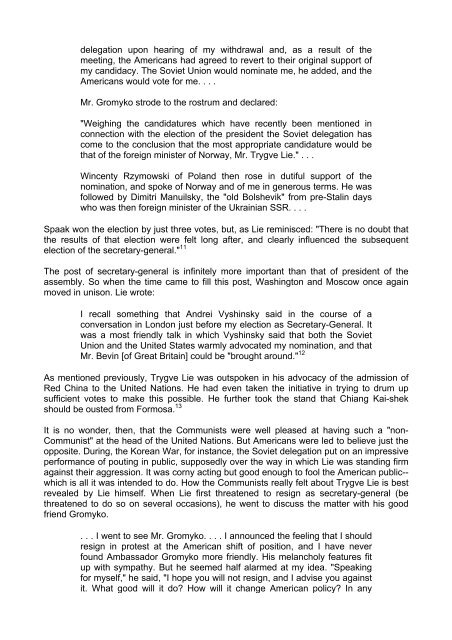
![Robert T McQuaid [rtmq@stn.net] Sent: Friday, October 29, 2004 12 ...](https://img.yumpu.com/51070071/1/190x245/robert-t-mcquaid-rtmqstnnet-sent-friday-october-29-2004-12-.jpg?quality=85)

